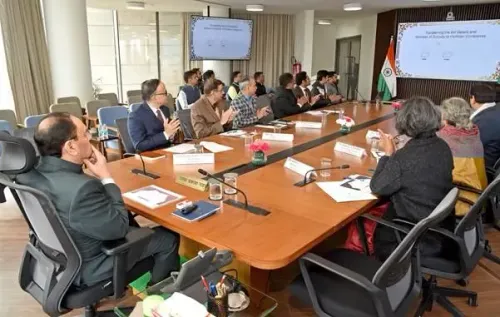Can Steady Ties Between India and Japan Ensure Indo-Pacific Stability?

Synopsis
Key Takeaways
- Practical cooperation between Japan and India is crucial for Indo-Pacific stability.
- Both nations view the region as an interconnected strategic space.
- Emphasis on freedom of navigation and respect for international law.
- Challenges remain in translating shared visions into effective collaboration.
- Potential for a model of middle-power cooperation.
Tokyo, Nov 14 (NationPress) Despite the ongoing contestation and dynamism in the Indo-Pacific arena, a report released on Friday underscores that consistent and practical collaboration between Japan and India is vital for maintaining an open, stable, and secure region.
The report elaborates that, at its core, both Tokyo and New Delhi perceive the Indo-Pacific as an integrated strategic expanse stretching from the eastern shores of Africa to the western Pacific, grounded in inclusiveness, freedom of navigation, and adherence to international law as the normative framework for their interactions.
In an article for ‘Japan Forward’, Pema Gyalpo, a Visiting Professor at the Takushoku University Centre for Indo-Pacific Strategic Studies, highlighted that Japanese Prime Minister Sanae Takaichi has underscored a “free and open Indo-Pacific” as a fundamental aspect of her strategic foreign and security policy. However, he pointed out that the Japanese media has often overlooked this statement and its significance for India, due to either intentional omission, ignorance, or concerns about responses from “noisy” neighbors.
“As Takaichi's mentor, the late Prime Minister Shinzo Abe foresaw, the Indo-Pacific has emerged as the strategic core of the twenty-first century, characterized by shifting power dynamics, disputed maritime territories, and an increasing focus on economic security. In this fluid landscape, Japan and India have established themselves as two crucial democracies striving to shape a rules-based regional order,” Gyalpo remarked.
“Both countries have consistently articulated comparable visions through Japan's free and open Indo-Pacific (FOIP) and India's Indo-Pacific Oceans' Initiative (IPOI). Nonetheless, the true challenge lies in translating these shared principles into enduring and practical collaboration. Their alliance has gradually transformed into one of the most substantial foundations of regional stability, though it also encounters challenges in depth and institutional resilience,” he continued.
The report noted that for Japan, India acts as a democratic counterbalance and a strategic link to the western Indo-Pacific, while for India, Japan provides a technologically advanced partnership and access to the Pacific maritime framework, aligning with India's emphasis on the Indian Ocean's centrality.
Furthermore, the report suggests that both nations can develop a model of middle-power collaboration demonstrating how economic and security partnerships can reinforce rather than compromise sovereignty.
“The upcoming challenge is to evolve this partnership from mere convergence to enhanced capability. This entails ongoing co-investment in essential sectors, collaborative defense production, unified digital standards, and synchronized maritime presence,” it concluded.










